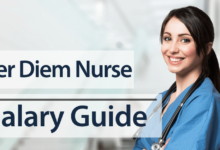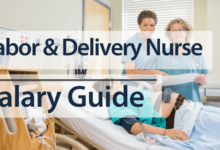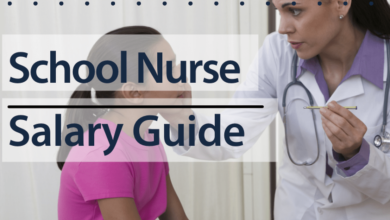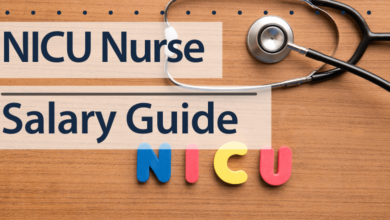How Much Do MSN Nurses Make?
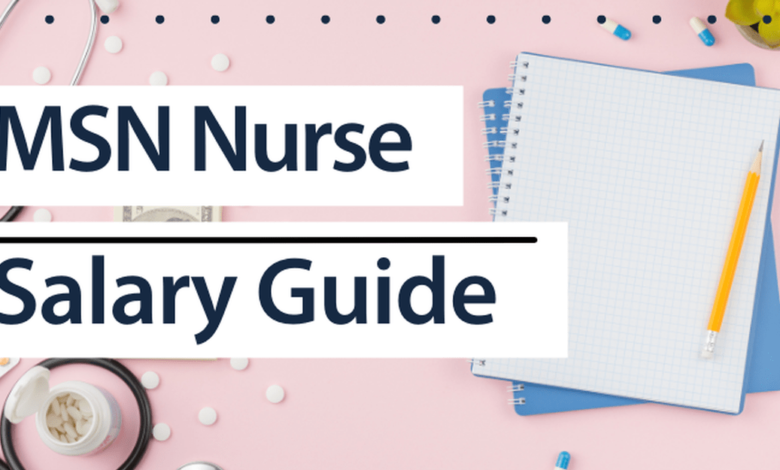
Earning a Master’s Degree in Nursing (MSN) can help you advance your nursing career into several different exciting and higher-paying positions within the health care industry. The U.S. Bureau of Labor Statistics (BLS) states that in 2021, advanced practice registered nurses (APRNs) earned a median income of $123,780 per year or $59.51 per hour.
But the average salary you can earn depends largely on the type of MSN you obtain.
Median annual U.S. salaries in 2021 via BLS
The location where you work as an MSN-trained nurse is one of the factors that will determine your overall salary. Salaries are also dependant on the type of MSN-trained education you achieve. However, the states that pay a higher salary for one type of MSN degree usually also pay higher wages for other types.
| Highest Paying States for NPs | Highest Paying States for CNMs | Highest Paying States for CRNAs |
|---|---|---|
| California – $151,830 | West Virginia – $163,190 | Alaska – N/A |
| New Jersey – $137,010 | Utah – $143,890 | Connecticut – $276,540 |
| New York – $133,940 | California – $137,070 | New Jersey – $263,850 |
| Washington – $130,840 | Massachusetts – $129,360 | Illinois – $250,280 |
| Massachusetts – $129,540 | New York – $126,170 | West Virginia – $247,650 |
Source: Annual Mean Wages via May 2021 BLS National Occupational Employment and Wage Estimates
| State | NP Salary | CNM Salary | CRNA Salary |
|---|---|---|---|
| Alabama | $102,410 | N/A | $102,410 |
| Alaska | $113,820 | $96,020 | N/A |
| Arizona | $119,910 | $97,490 | $142,250 |
| Arkansas | $107,080 | N/A | $151,940 |
| California | $151,830 | $137,070 | $232,540 |
| Colorado | $112,580 | $122,620 | $173,820 |
| Connecticut | $120,450 | $111,980 | $276,540 |
| Delaware | $116,230 | $106,730 | N/A |
| District of Columbia | $125,290 | $94,030 | N/A |
| Florida | $104,830 | $91,160 | $170,950 |
| Georgia | $109,560 | $99,140 | $177,960 |
| Hawaii | $127,490 | $100,730 | $218,750 |
| Idaho | $105,290 | $61,740 | $171,790 |
| Illinois | $120,470 | $115,690 | $250,280 |
| Indiana | $113,490 | $119,380 | $190,200 |
| Iowa | $121,370 | N/A | $207,240 |
| Kansas | $108,710 | $59,960 | $159,560 |
| Kentucky | $106,080 | $109,560 | $180,330 |
| Louisiana | $112,650 | N/A | $166,810 |
| Maine | $116,370 | $125,020 | $209,050 |
| Maryland | $115,700 | $113,860 | $180,560 |
| Massachusetts | $129,540 | $129,360 | $219,680 |
| Michigan | $108,770 | $112,370 | $218,240 |
| Minnesota | $127,010 | $119,970 | $214,460 |
| Mississippi | $111,750 | N/A | $182,940 |
| Missouri | $103,490 | $88,970 | $192,320 |
| Montana | $115,710 | N/A | N/A |
| Nebraska | $112,670 | N/A | $232,230 |
| Nevada | $123,680 | N/A | N/A |
| New Hampshire | $120,730 | $111,340 | $227,130 |
| New Jersey | $137,010 | $109,400 | $263,850 |
| New Mexico | $118,480 | $107,600 | $164,900 |
| New York | $133,940 | $126,170 | $225,180 |
| North Carolina | $112,730 | $102,960 | $206,450 |
| North Dakota | $112,720 | N/A | $208,170 |
| Ohio | $112,490 | $116,780 | $187,410 |
| Oklahoma | $116,650 | N/A | $181,660 |
| Oregon | $128,190 | $122,880 | $225,560 |
| Pennsylvania | $117,260 | $111,980 | $203,150 |
| Rhode Island | $126,760 | $114,300 | N/A |
| South Carolina | $102,850 | N/A | $213,830 |
| South Dakota | $112,320 | N/A | $197,710 |
| Tennessee | $95,120 | $99,250 | $99,250 |
| Texas | $117,890 | $85,030 | $197,540 |
| Utah | $112,920 | $143,890 | N/A |
| Vermont | $109,660 | $102,160 | $196,240 |
| Virginia | $112,320 | $106,610 | $203,600 |
| Washington | $130,840 | $111,780 | $244,730 |
| West Virginia | $104,750 | $163,190 | $247,650 |
| Wisconsin | $116,990 | $117,170 | $235,550 |
| Wyoming | $114,530 | N/A | $223,680 |
Source: May 2021 BLS National Occupational Employment and Wage Estimates
Nurses with an MSN most commonly work in hospitals or physician offices, however, nurses with an MSN may make even more money working in other industries outside of the traditional healthcare setting.
For nurse practitioners, these are the highest-paying industries according to the BLS:
- Accounting, Tax Preparation, Bookkeeping, and Payroll Services: $148,980
- Business, Professional, Labor, Political, and Similar Organizations: $133,800
- Home Health Care Services: $133,170
- Psychiatric and Substance Abuse Hospitals: $131,830
- Outpatient Care Centers: $129,190
There is a wide range of career opportunities for MSN nurses. Some of the potential careers and their median US incomes include:
With a median income of $195,610, CRNAs are at the top of the list when it comes to the highest MSN earners!
A CRNA, or nurse anesthetist, provides analgesia to patients before or during surgery, childbirth, or other medical procedures. Their job entails giving pain relief and comfort measures to patients while also monitoring their physiology to ensure that they are safe as they receive various medications.
If you are considering becoming a CRNA, you should know that in 2025 CRNAs will be required to obtain a doctorate degree to practice.
Nurse practitioners are a type of APRN who is trained and qualified to provide medical care for patients. Depending on the state’s nursing laws, NPs often work under the supervision of a physician; however, in many states, NPs are allowed to work independently and even own their own practice!
A CNM, or nurse-midwife, is an APRN who provides care for women of all ages. They are most known for caring for women during the pre-and postpartum period and assisting women during childbirth.
Clinical Nurse Specialists are MSN-trained clinicians who work in various areas of healthcare. CNSs usually study within certain specialties, such as emergency care, geriatrics, women’s health, or critical care.
A CNS provides care at the bedside; however, their primary role includes educating and supporting nurses who care for patients. They incorporate evidence-based practice into nursing units to achieve the highest level of care possible.
If working with technology interests you, becoming an informatics nurse might be a perfect career fit! Informatics nurses help improve nursing care through computers and healthcare technology.
Some of the most common technology that informatics nurses work with include electronic medical records (EMR) and data entry equipment for healthcare providers.
A Clinical Nurse Leader focuses on overall patient care and management. Some of their tasks include care coordination, outcome management, risk assessment, quality improvement, and the transition of care.
Nursing Administrators perform various management tasks within the healthcare setting. But their most essential job usually includes managing the nursing staff. You can find nurse administrators working in hospitals, clinics, physician offices, long-term care facilities, and mental health institutions.
Nurse administrators frequently work with other managers to ensure that a healthcare organization runs smoothly while also managing the financial aspects of the business.
Nurse educators are essential education providers for nurses of all educational levels, including ADN, BSN, MSN, and doctoral degrees. They provide teaching at the bedside, in the classroom, and in simulation settings.
If helping nurses hone their nursing skills, develop critical thinking abilities, and advance their careers, becoming a nurse educator might be a great nursing career for you.
The BLS states that the 2021 median income of RNs with a bachelor’s degree or Associate’s Degree in Nursing (ADN) was $77,600 per year or $37.31 per hour.
When you compare the median BSN salary to the income of an APRN or nurse administrator, nurses who earn an MSN can, on average, make between $29,000 to $42,000 more per year!
It is also essential to consider several other factors that come into play when determining the overall BSN to MSN salary, like the city and state where you live, the type of industry you work in, whether you work full-time or part-time, and the type of MSN degree earned.
Achieving an MSN can completely alter your nursing career in the best possible way. There are so many potential career opportunities with higher salaries to match for nurses who pursue advanced education.
One of the biggest reasons many nurses decide to obtain an MSN is because they want more opportunity within their career that does not involve working at the bedside. The skills you can learn while obtaining an MSN will earn you more money. But it also helps by improving patient care, providing more nursing autonomy, and elevating the nursing profession as a whole. Best of luck to you on your MSN journey!

